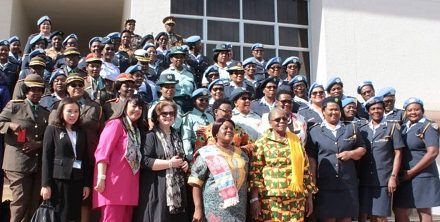
African leaders call for equality and reform of the United Nations Security Council

SANF – Leaders from Africa speaking at the 75th UN General Assembly in New York have presented a strong case for reform of the United Nations Security Council to ensure that all members can relate on the basis of equality rather than the current scenario where the Council is dominated by a few powerful nations.
The African Union Chairperson, President Cyril Ramaphosa of South Africa said the current structure and composition of the Security Council does not reflect the world in which we live.
For example, the five permanent members have veto power, but none is from Africa, yet the continent provides the largest membership of the UN.
The United Nations has 193 member states of which 54 are from Africa, Asia-Pacific has 53, the Eastern European Group (23), the Western European and Others Group (28), while the Latin American and Caribbean Group has 33 members.
The remaining two members are observer states — the State of Palestine and the Holy See.
The five permanent members are China, France, Russia, the United Kingdom and the United States, with three of them in Europe.
The permanent members have the power of veto, meaning that the Council cannot implement any decision if one of the five permanent members objects to it.
The Security Council has 10 additional, non-permanent members elected for two-year terms by the UN General Assembly. However, these members do not have veto powers.
A country which is a member of the UN but not the Security Council may participate or be invited when the Council considers that interests of the country are affected, however without a vote in the discussions.
Conditions of participation are set by the Council, which determines all important decisions on peace and security in the world.
Ironically, Africa is the recipient of the most declarations on peace and security but continues to be marginalized in influencing such decisions.
The current composition of the Security Council does not reflect the world in which we live, Ramaphosa said, adding that on the 75th anniversary of the UN we repeat our call for greater representation of African countries on the Security Council, and that this be taken up with urgency at the Intergovernmental Negotiations.
It is only through a reformed and inclusive UN Security Council that we will be able to collectively resolve some of the worlds most protracted conflicts.
The outgoing chairperson of the SADC Organ on Politics, Defence and Security Cooperation, President Emmerson Mnangagwa of Zimbabwe said it is regrettable that Africa continues to be misrepresented at the UN Security Council despite the continent having the largest membership.
He said there is a need for the UN to implement the Ezulwini Consensus made by Africa in 2005.
The Ezulwini Consensus is based on the idea of regional representation rather than the current UN system of representation by individual countries. The consensus calls for expansion of the Council from 15 to 26 members, with fair representation from Africa.
On the issue of the selection of Africa’s permanent representatives in the Council, the Consensus clearly states that the question of the criteria for the selection of African members of the Security Council should be a matter for the AU to determine, taking into consideration the representative nature and capacity of those chosen.
A permanent seat for Africa on the UN Security Council will allow the continent to at least have some voice in all decision-making organs of the UN, setting the stage for the reconstruction of global affairs.
It is deeply regrettable that the reform of the Security Council and the implementation of Africa’s position has not been achieved, said Mnangagwa.
We cannot continue with a situation where over 16% of the worlds population does not have a voice in decision making. This is a serious indictment to our avowed commitment to multilateralism and the basic principles of natural justice, fairness and equity.
With regard to new and emerging challenges such as climate change, illicit flows and terrorism, the continent said a more coordinated approach will help the world to address these challenges.
In southern Africa, climate change has increased the frequency and impact of disasters such as floods and drought, thus impacting on development and integration.
It is against this background that African leaders called for tighter measures to address these challenges, with Namibian President Hage Geingob urging the global community to fully implement the Paris Agreement, which aims to mitigate the effects of climate change.
Southern African News Features are produced by the Southern African Research and Documentation Centre (SARDC), based in Harare. www.sardc.net













































